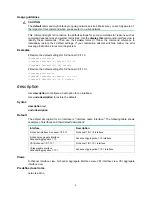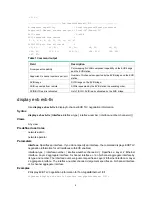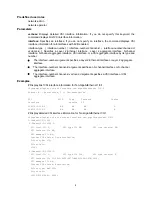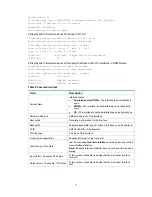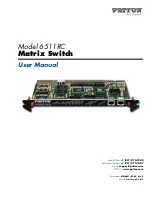
4
<1, 1>
---------------------------Ten-GigabitEthernet1/0/1---------------------
S-component capability : Local-supported/Remote-supported
Supported S-Channel numbers per-port : Local-167/Remote-167
SVID range : 2-4094
SCID requested from remote :
1, 2, 3, 4, 6, 10, 11, 12, 34, 35, 67
SCID/SVID pair list allocated :
<1, 1>, <2, 3>, <3, 2>, <4, 5>, <6, 4>,
<10, 9>, <11, 6>, <12, 7>, <34, 23>, <35, 35>,
<67, 67>
Table 1 Command output
Field Description
S-component capability
Port-mapping S-VLAN component capability on the EVB bridge
and the EVB station.
Supported S-channel numbers per-port
Number of S-channels supported by the EVB bridge and the EVB
station.
SVID range
SVID range on the EVB bridge.
SCID requested from remote
SCIDs requested by the EVB station in ascending order.
SCID/SVID pair list allocated
List of (SCID, SVID) pairs allocated by the EVB bridge.
display evb evb-tlv
Use
display evb evb-tlv
to display S-channel EVB TLV negotiation information.
Syntax
display evb evb-tlv
[
interface
interface-type
{
interface-number
|
interface-number
:
channel-id
} ]
Views
Any view
Predefined user roles
network-admin
network-operator
Parameters
interface
: Specifies an interface. If you do not specify an interface, the command displays EVB TLV
negotiation information for all interfaces with EVB enabled.
interface-type
{
interface-number
|
interface-number
:
channel-id
}: Specifies a Layer 2 Ethernet
interface, Layer 2 aggregate interface, S-channel interface, or an S-channel aggregate interface by
its type and number. The
interface-number
argument specifies a Layer 2 Ethernet interface or Layer
2 aggregate interface. The
interface-number
:
channel-id
argument specifies an S-channel interface
or S-channel aggregate interface.
Examples
# Display EVB TLV negotiation information for Ten-GigabitEthernet 1/0/1.
<Sysname> display evb evb-tlv interface ten-gigabitethernet 1/0/1





